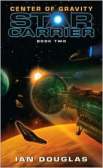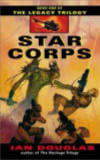These are sequels to the exciting Heritage and Legacy trilogies. As before, the focus is on the Marine Corps and its role in imagined future conflict. Note: Ian Douglas is a pen name for William H. Keith.
 Star Strike
Star Strike
This is the first book in the third trilogy about US Marines. The story jumps ahead about half a millenium. The Xul still threaten humankind, but have been quiescent since the events of Star Marines. As per usual, the Marines are hindered by a misguided politician, then proceed to save the day and win a great victory. There is the usual boot camp training sequence with a new scion of the Garroway line.
While the plots are becoming somewhat formulaic, these novels are still of high quality. The action is gritty, the story is epic, and the books are real page turners. I was afraid that all the “future tech” would somehow make the story less relatable, but this is not so. Douglas manages to explain well how technologies like AIs, direct mind link to computers and virtual spaces change the way humans interact. He also infuses the book with a sense of history, and understands that political entities and priorities can shift dramatically over time.

 Galactic Corps
Galactic Corps
The second book of the trilogy picks up the story about a decade after Star Strike. Once again, there is an annoying politician. The Marines now attempt a blow at the very heartland of the Xul, in the radiation saturated galactic core.
While the first half follows the usual formula, the second half, with operations in the core, is truly excellent. Very exciting and with many elements from “sense of wonder” stories like Ringworld and Rendevous with Rama. These are areas that military Scifi doesn’t usually touch upon but could and should more often. A very strong middle book and another page turner.

 Semper Human
Semper Human
After a thousand year “break” in the macrostory, the Marines are back. Revived from a centuries long hibernation (de facto a kind of reserve status), they wake to a radically different galactic society, with a plethora of alien races, as well as new offshoots of the human race. The reason for their awakening is that the Xul seem to be altering reality by subtly influencing human minds through the spooky effects of quantum physics.
After the breakneck action of the previous two books, this one feels very slow to start. A lot of time is spent discussing the changes to galactic society of the past centuries. The usual “Marines are anachronisms” message, only more so, and to excess. Once battle is joined, so to speak, it doesn’t feel anywhere near as visceral as previously. The characters are dull and lack the compelling qualities of those in earlier installments. Douglas redeems himself a bit at the end with some excellent historical vignettes, but it is not enough. Unfortunately, the book becomes one long treatise about why Marines have always pulled mankind’s (and in this case Galactic Society as whole’s) chestnuts out of the fire. While I understand and even agree with the message, it is far too heavy handed. So this ninth, and possibly last, book of the saga unfortunately ends it with a sizzle where there should have been a bang. A big, big bang.





















